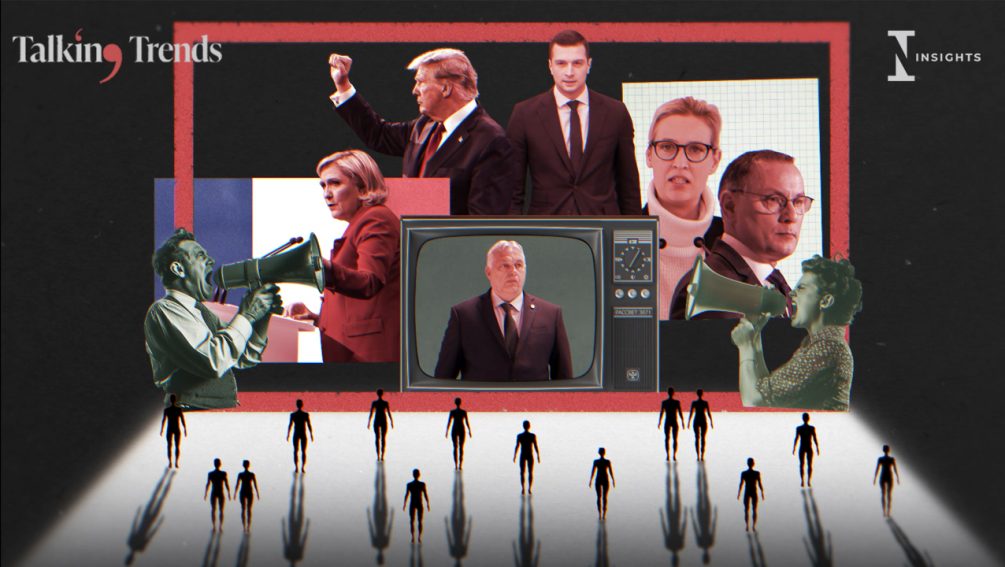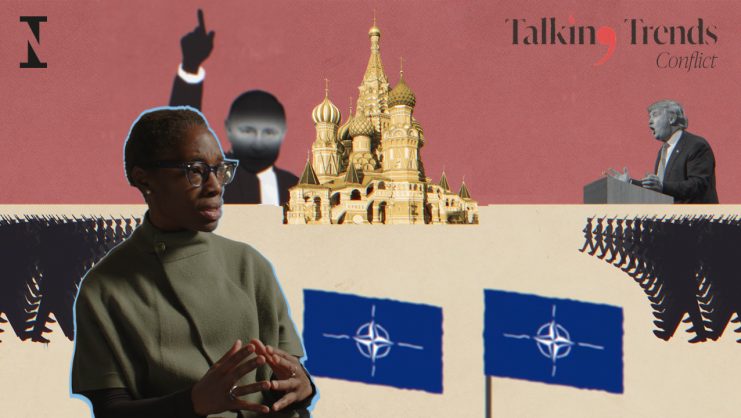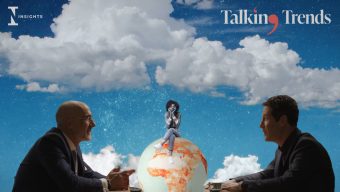Populism & the Media: Talking Trends

What is driving the surge of nationalist movements in Europe and beyond? Roger Cohen sits down with Manuel Muñiz to discuss the rise of populism and the media’s role in the increasing discontent with the global order.
© IE Insights.
Transcription
Manuel Muñiz: Roger it’s wonderful to have you here. Now you live in Paris, and you run the New York Times bureau there. But you’ve known Europe very well, and you’ve worked in Europe and you grew up in Europe. So I wanted to ask you this question, globalization and its discontents. So the rise of political movements in Europe that question fundamental features of the international order and of globalization, which seems to be a trend that is not exclusive to Europe.
But it’s happening in Europe. It’s happening definitely in France, where you live, here, in Germany, and many other places. Where do you think this is all coming from?
Roger Cohen: Well, thank you, Manuel, and a pleasure to be here. I think there was a great deal of optimism and a certain number of illusions about our liberal democracies when the Cold War ended, 30 plus years ago. And everybody thought history was moving in the right direction.
You’ve seen a tremendous rise in inequality in recent decades. you’ve seen a growing disparity between what I would call the wired metropolis of the knowledge economy, where people live globalized lives and feel comfortable within them, and what the French call la périphérie, the periphery, the outlying areas, in the United States sometimes referred to as flyover country.
And in these areas, life has been lived very differently. It’s been lived as being excluded, being forgotten, even being invisible. There’s been a growing cultural gulf between the city and outlying areas over issues like gender, wokeness, as it’s called. And so people feel that their way of looking at things is not respected. They’ve suffered also economic difficulty, very often closing of factories and so on. Although Europe is now trying to re-industrialize. So societies both in the U.S. and in Europe have suffered internal fracture.
And that internal fracture contributes to global fracture because it gives rise to political movements that are nationalist, that want stronger borders, that maybe isolationist, America first. And it has its equivalents in Europe. So many people feel there is something wrong with their lives, that maybe their kids will not live better than they did. And it creates an anger and a malaise that then feeds the rise of a Donald Trump. Of the AfD extreme-right party in Germany, of Marine Le Pen in France and Jordan Bardella and on and on and on and on.
MM: Can I ask you something? Because part of the anger of these groups has been sort of against the elites in a broad sense of political elites, business elites, intellectual elites, to some extent with the media as well. Because they didn’t feel that they were being seen or heard. So given your work, how much effort do you put into trying to go out and listen to these folks?
Because we’ve sort of failed and not just the media. As an academic, I remember when Trump won, but we had Brexit, then Trump won. I was in the US at the time, I was at Harvard at the time. And nobody, nobody saw this coming. Nobody and nobody could actually explain it afterwards. I mean, it took a while for this diagnosis that you’ve grown, which is sort of the rise of populism as a consequence of a cultural backlash and then an economic fracture that took some time to actually be produced.
So we were very surprised. So this failure of seeing this, I don’t know if you agree.
RC: Yeah. I think that’s an important point. The moment I realized that Trump might well win, I remember it very well, I went to Kentucky precisely because I thought I had to try to understand this phenomena. It was no use sitting in New York City where everybody thought the same and thinking you can understand it. And contempt, I think in Western societies has been a scourge.
It’s been a scourge because nobody ever had their mind changed by being made to feel stupid. And if you show contempt to people who think differently, but maybe just as intelligent as you are, but they think in another way, causes further polarization and fracture. So anyway, in Kentucky, I met a bunch of people who were going to vote Trump.
And what struck me was they had no illusions about him. He may drag us into a war. he’s far from ideal, but we need to blow the system up. You know, we need radical change. And I think that’s what you’re beginning to get in France. We’ve tried everything. Now we need to try something different. And it may be perilous, but we feel that the cards have been stacked so unevenly, that we need to do something.
So, yes, I agree with you. I think, look, on the eve of the 2016 election, I think the New York Times had 91% Hillary Clinton victory and 9% Trump. And then the needle, as the evening went on, went in one direction toward Trump. So, the commons in our societies, the places where people of different backgrounds converge and can actually exchange ideas, have diminished.
Everybody’s in their silo. They get comforted in what they already believe on the social media channels they choose or on the TV networks they choose. And it’s pretty dangerous.
MM: Can I ask you about that? Because it was precisely where I was headed with this. And just a quick comment, by the way, before I do that on the contempt, because it was so evident. I think Hillary Clinton referred to these folks as “the deplorables” at one point. She did. In Europe and in Spain, we had, of course, the 15-M Movement, and people here referred to them as they called them “perroflautas”, which is a combination of dog and flute, so you can imagine this was a way of saying these folks, the attack on the values of the youth.
This idea that, no, they don’t have the right set of values, and it’s an issue of this generation and not looking at the underlying facts of economic fracture, and many others. I think that has been a clear, clear problem. Another line of argumentation is they’re misinformed or disinformed. And there might be some substance or not to this. I wanted to ask you because you, of course, you’ve been working at traditional media for a long time. What do you think is happening to the sources of information for folks? And do you think this is magnifying these problems or how is that playing out, how do you think?
RC: Well, along with everything we’ve been talking about, there’s been a fracturing of the understanding of the word truth. Donald Trump’s fake news campaign certainly hit home, in many ways. And a lot of people don’t trust the media. I think, look, there are a lot of journalists working in good faith to try and establish the facts, make sure they’re facts, and present them in a balanced way.
There are plenty of media outlets, Fox News and other equivalents in Europe now that are presenting, are not so concerned with the facts and are presenting a very lopsided picture. Now they would say the mainstream media does that in the other direction. So I think, yes, I think that is certainly an issue, young people need to try to learn how to balance different viewpoints to reach a balanced conclusion.
But even as I say that, I think it’s a long shot, you know, because there’s so much in our society that’s just tilted in one way. I mean, everybody during the Trump campaign, I would say, well, five times a day he lies. And they’d say “no, he’s the most honest guy in politics.”
I’d say “well how can you say that?” “Well, he tells it like it is. He said things that nobody else would say.” I mean, starting with calling a lot of the Mexican migrants rapists, in his first speech, immediately went to number one in the Republican race for the nomination, and he was never dislodged from there.
MM: So let me ask you a final question, which is, do you think folks are now listening to this underlying sort of noise in our societies’ level of discontent? Is this better covered, better understood? And, do you think there’s now an appropriate reaction on the part of policy? What is, sort of connected to this?
What is the solution to this? If there is any, is it about leadership? Is it about crafting better economic policies? I mean, a vision moving forward as the last one?
RC: I think there’s some effort I think to understand where people are coming from when they want a more nationalist, or anti-immigrant approach. It’s not an unreasonable position to say that a country should be able to control its borders, and that if you have hundreds of thousands of people coming illegally across those borders, whether it’s the border between the United States and Mexico or it’s the border of the 27-nation European Union, which is a completely porous border, let’s not delude ourselves.
There’s this police force or customs force Frontex, but I don’t know how many agents it has. But for a very, very long border, it’s entirely inadequate. So to say this is an issue, this is a problem. Or I see my neighborhood changing, I see the schools where my kids are changing. These are not wildly, unreasonable positions. And, both in the United States and in Europe, there’s been a great deal of difficulty in trying to reach some kind of agreed immigration policy.
That’s one area where if there could be such a thing, it would make an enormous difference. I do think that journalists have a solemn responsibility, you know, boots on the ground. You’ve got to get out there if you’re going to understand. And you have to talk with an open mind to people, as I said, who have different views. It doesn’t make them stupid. Some of them are stupid, and some of them say wild and racist and bigoted and totally unacceptable things. But many of them are people who think liberals have gone too far, they’ve gone too far in their wokeness.
They’ve gone too far on gender transitioning. They’ve gone too far in their economic privilege, they’ve gone too far culturally. Too far in just throwing open the doors to any migrant who wants to come. And these issues need to be debated rather than viewed as two sides of a chasm with no way to come across. And when there’s a wall, when there’s a chasm, understanding disappears. And when there is no understanding, that’s a direct route to conflict.
MM: Absolutely. And, my biggest source of optimism is that part of this diagnosis, I think, is now much more widely shared than it was in 2016, 17, even 2018. So I think that some of the solutions are being built. So I am much more optimistic than I was in 16. Yeah,
RC: I am in a way too, just because I think the level of connectedness and in our societies and between societies, compared to when totalitarian systems were built or compared to when world wars came about, is so exponentially greater and only going further in that direction that that degree of connectedness, particularly among young people, is positive. And it can’t be undone, I don’t think, and, it’s a source of hope, at least to me.
MM: Absolutely. Well, Roger, thank you for being here. Thank you for sharing your thoughts with us.
RC: Thank you. A pleasure.





